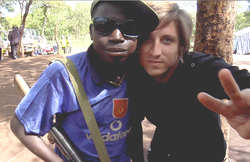For the second-half of Swahili class tonight, we attended the Invisible Children film event on campus. The film was captivating and charming. After it was over, we heard from a poignant young Ugandan woman who had benefited from a scholarship from Invisible Children. I was fired up.
But at the same time (especially as I delve deeper into the skepticism of Bill Easterly) something irked me about the strangely alluring confidence of this aid organization. To no surprise, Chris Blattman has nailed it on the head:
There’s also something inherently misleading, naive, maybe even dangerous, about the idea of rescuing children or saving of Africa. It’s often not an accidental choice of words, even if it’s unwitting. It hints uncomfortably of the White Man’s Burden. Worse, sometimes it does more than hint. The savior attitude is pervasive in advocacy, and it inevitably shapes programming. Usually misconceived programming.... More often, though, it leads to bad programs, misallocated resources, or ill-conceived military adventures.
More nailing on the head.
Adendum (9/24): As I thought more about imagery and story of Invisible Children, I realized it aligns perfectly with How to Write About Africa. I also found some more thoughtful criticisms of DIY foreign aid:
Another question that's often overlooked: What impact do outside money and volunteers have on the local economy, political structures, and culture? Adding a wealthy outside investor can skew incentives in unexpected ways. Local businesses lose market opportunities when NGOs give donated goods away, for example.
From FindWhatWorks.
But at the same time (especially as I delve deeper into the skepticism of Bill Easterly) something irked me about the strangely alluring confidence of this aid organization. To no surprise, Chris Blattman has nailed it on the head:
There’s also something inherently misleading, naive, maybe even dangerous, about the idea of rescuing children or saving of Africa. It’s often not an accidental choice of words, even if it’s unwitting. It hints uncomfortably of the White Man’s Burden. Worse, sometimes it does more than hint. The savior attitude is pervasive in advocacy, and it inevitably shapes programming. Usually misconceived programming.... More often, though, it leads to bad programs, misallocated resources, or ill-conceived military adventures.
More nailing on the head.
Adendum (9/24): As I thought more about imagery and story of Invisible Children, I realized it aligns perfectly with How to Write About Africa. I also found some more thoughtful criticisms of DIY foreign aid:
Another question that's often overlooked: What impact do outside money and volunteers have on the local economy, political structures, and culture? Adding a wealthy outside investor can skew incentives in unexpected ways. Local businesses lose market opportunities when NGOs give donated goods away, for example.
From FindWhatWorks.

 RSS Feed
RSS Feed